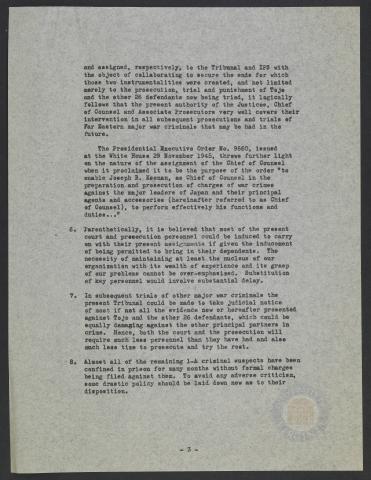
Page 3
| Parent | Trial of Remaining Major War Criminals |
|---|---|
| Date | 23 September 1947 |
| Language | English |
| Collection | Tavenner Papers & IMTFE Official Records |
| Box | Box 5 |
| Folder | General Memoranda and Reports from September 1947 |
| Repository | University of Virginia Law Library |
and assigned, respectively, to the Tribunal and IPS with the object of collaborating to secure the ends for which those two instrumentalists were created, and not limited merely to the prosecution, trial and punishment of Tojo and the other 26 defendants now being tried, it logically follows that the present authority of the Justices, Chief of Counsel and Associate Prosecutors very well covers their intervention in all subsequent prosecutions and trials of Far Eastern major war criminals that may be had in the future. The Presidential Executive Order No. 9660, issued at the White House 29 November 1945, throws further light on the nature of the assignment of the Chief of Counsel when it proclaimed it to be the purpose of the order ?Ç£to enable Joseph B. Keenan, as Chief of Counsel in the preparation and prosecution of charges of war crimes against the major leaders of Japan and their principal agents and accessories (hereinafter referred to as Chief of Counsel), to perform effectively his functions and duties . . . ?Ç£ 6. Parenthetically, it is believed that most of the present court and prosecution personnel could be induced to carry on with their present assignments if given the inducement of being permitted to bring in their dependents. The necessity of maintaining at least the nucleus of our organization with its wealth of experience and its grasp of our problems cannot be over-emphasized. Substitution of key personnel would involved substantial delay. 7. In subsequent trials of other major war criminals the present Tribunal could be made to take judicial notice of most if not all the evidence now or hereafter presented against Tojo and the other 26 defendants, which could be equally damaging against the other principal partners in crime. Hence, both the court and the prosecution will require much less personnel than they have had and also much less time to prosecute and try the rest. 8. Almost all of the remaining 1-A criminal suspects have been confined in prison for many months without formal charges being filed against them. To avoid any adverse criticism, some drastic policy should be laid down now as to their disposition.
